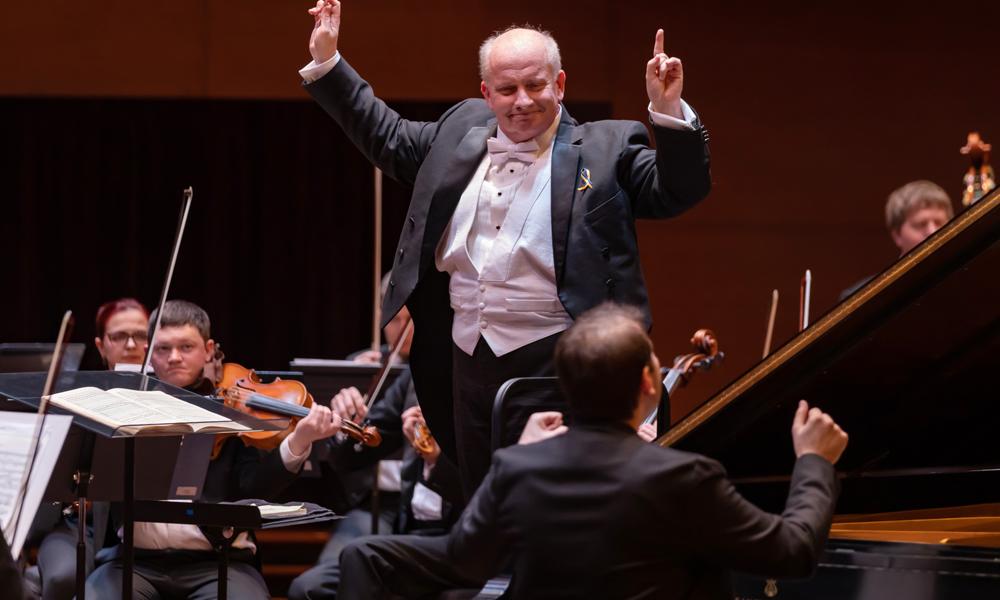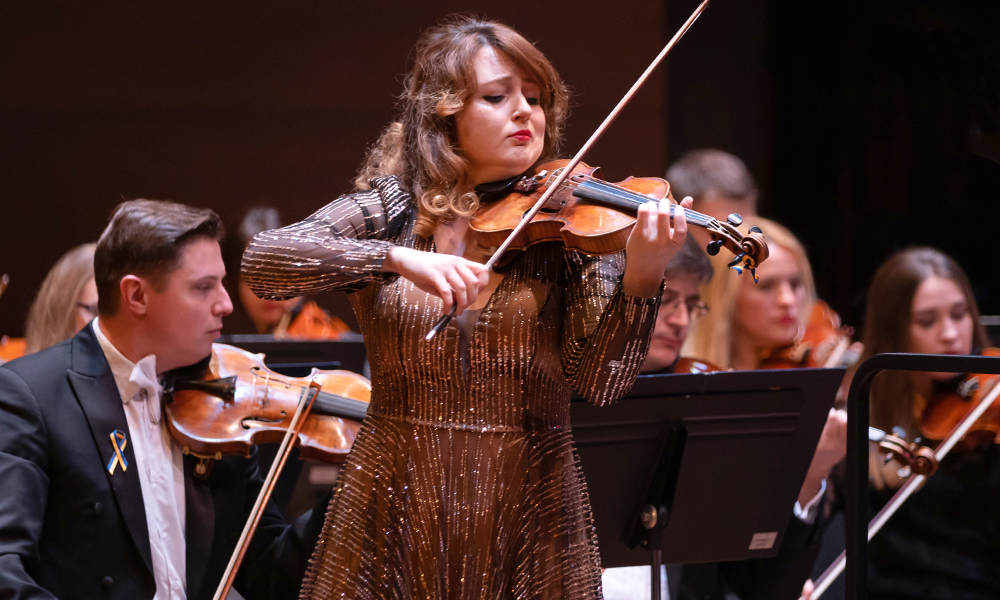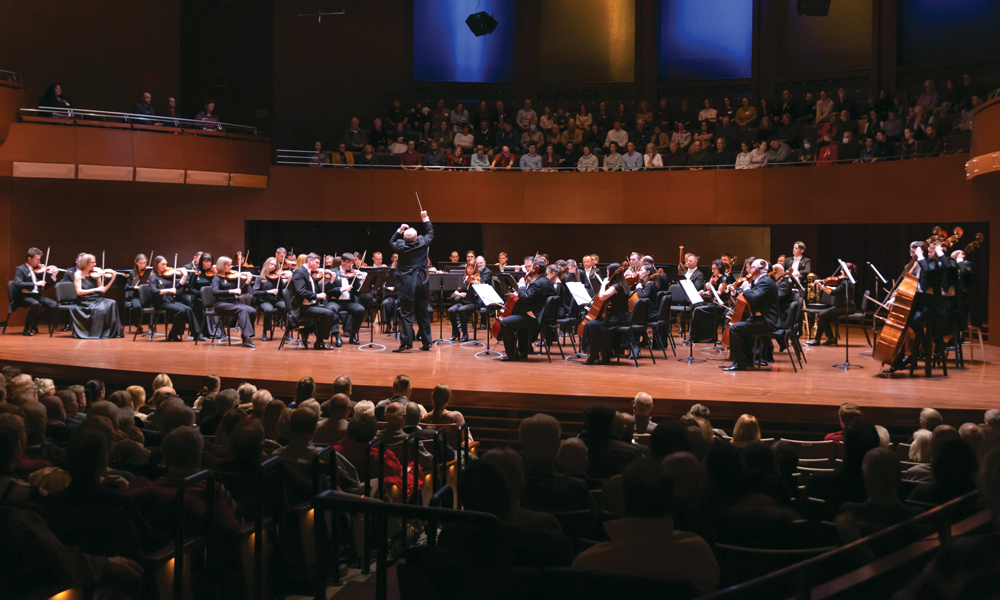Ukrainian orchestra honors homeland through song
Featured Stories
SUMMARY: Orchestra members share their experiences living through the war in western Ukraine and how their tour is a testament to the power of music to overcome adversity.
On Feb. 3, the Lviv National Philharmonic Orchestra of Ukraine performed at the Forbes Center for the Performing Arts as part of its six-week U.S. tour. The program, which consisted of a broad range of classical and folk compositions — many of them Ukrainian — brought standing ovations for the 68 musicians from western Ukraine.
The orchestra booked the tour long before Russian President Vladimir Putin’s full-scale invasion of the country in February 2022, but the Forbes Center performance took on added significance against the backdrop of the ongoing war, which had claimed more than 8,300 lives as of March and displaced 8.1 million Ukrainian citizens.
Dozens of those refugees were in attendance at the Forbes Center performance. Village to Village, a nonprofit that helps displaced groups from around the world resettle in the Shenandoah Valley, coordinated free tickets for members of the local Ukrainian refugee community.
|
“We were prepared for this situation because we knew before, we understood, that Russia would be bombarding our activities, our infrastructure.” — Denys Lytuvynenko, cellist |
One of those in attendance was Alex Stupak, a classical music enthusiast, piano teacher and former Lviv resident. Many of Stupak’s friends are still in Ukraine, where almost daily alarms signal the threat of bombs. Although the danger deters some people, Stupak said, Ukrainians often stay outside, drinking tea or coffee under the night sky. “They don’t fear death.”
Despite their courage, power outages plague much of the country, said violinist Solomomiia Onyskiv. Even in western Ukraine, which borders Poland, Ukrainians only have three to four hours of electricity a day, which could go on at any time, including in the middle of the night while they are asleep.
“We were prepared for this situation because we knew before, we understood, that Russia would be bombarding our activities, our infrastructure,” said cellist Denys Lytuvynenko.
To get through the winter, they used heaters and generators to power and warm their homes.
Although the war has affected western Ukraine, most of the fighting is in eastern Ukraine, closer to Russia. When refugees came flooding out of the east, Lviv families and individuals housed them. “Almost everybody had somebody in their house or helped somehow,” Onyskiv said.
 |
| The passion of a violinst was evident as she played through multiple pieces. |
About three weeks after Russia invaded, 2 million Ukrainians were internally displaced, 200,000 of whom temporarily stayed in Lviv, which previously had a population of 750,000, according to National Public Radio. Onyskiv said the orchestra halted their musical activities for a few months to help eastern Ukrainians.
It was difficult for Lytuvynenko to leave the country because of his circumstances. He has a 7-month-old daughter, and all Ukrainian men between the ages of 18 and 60 are subject to marital law, meaning they can’t leave the country unless they fit into a specific category. “It’s difficult to leave the country,” Lytuvynenko said. “All the time, you need to ask, ‘May I go?’”
Once male orchestra members were approved to leave the country, they began a lengthy journey. Because of the war, Lytuvynenko said, “the sky is not open” — no one is allowed to fly in or out of Ukraine. The orchestra took a 12-hour bus ride into Warsaw, Poland, about 300 miles away from Lviv. Then they boarded a flight to the U.S., where they performed at a series of venues before reaching the Forbes Center. After leaving Harrisonburg, they performed at Carnegie Hall, the Kennedy Center and Radio City Music Hall.
 |
| Throughout the night, the audience rose to their feet for standing ovation after standing ovation in support of Ukraine. |
Although the JMU community was excited to host the ensemble, Theodore Kuchar, the orchestra’s conductor, said not every location they’ve visited shared the same enthusiasm. “Many people simply reacted to us with the understanding that this is a pity tour for Ukraine,” he said.
Kuchar has led orchestras in Asia, Australia, Europe, the Middle East, North America and South America. Born and raised in western Ukraine, he wanted to bring the orchestra from his homeland onto the international stage. Kuchar said it’s a “very fortunate position that we get to be the cultural ambassadors for Ukraine, especially because it’s such a very difficult time for the symphony.”
At one point during the performance, Kuchar placed the baton in his mouth and conducted solely with his hands.
Toward the end of the concert, the orchestra performed a traditional Ukrainian folk song. Refugees sitting in the balcony behind the stage waved large Ukrainian flags while the orchestra members below them joined in. The spectators once again sprang to their feet to show support for Ukraine.

